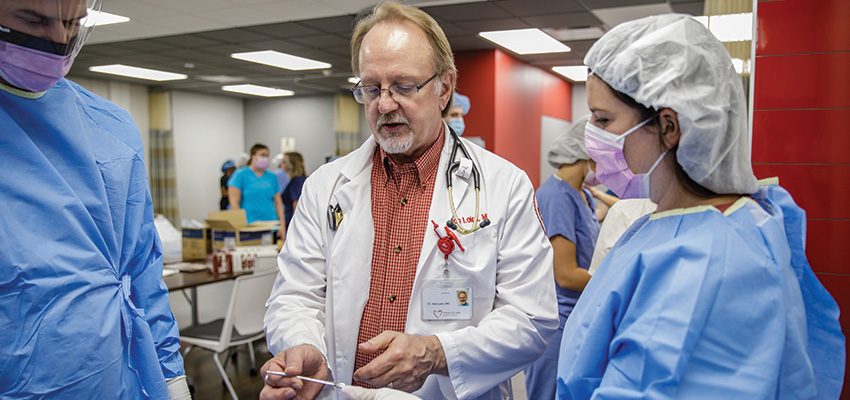Posts by Dr. Alan Laird
Posted on

I have had the privileged of watching several PA classes being transformed from laypersons to professionals ready to enter practice. That is not to say they have learned all they need to know; even 4 years of medical school can’t do that. But they are ready to become part of a healthcare team and enter their respective area(s) of practice. There they will have another learning curve of 5 – 7 years to be “comfortable” in all they do.
So, what is it like to be a PA-S (student) and be “transformed”? Of course it is different for each person. But the best analogy I can come up with is the chrysalis of a butterfly. Yes, it may be an over-used example. It certainly does not apply to just becoming a PA-C (clinician). And I have no idea how much self-awareness the caterpillar has in its transition; but I do think it is helpful to think.
You probably remember the process from a grade school experiment. The caterpillar, after reaching maturity, picks a branch, attaches itself, forms the chrysalis and eventually emerges looking quite different. So too, the PA student is admitted to a school, settles in, and begins the change process.
Remember watching that hanging object, day after day, wondering when and if the emergence would take place? At that young age we were not aware of what was going on inside. It seemed like nothing was happening! But, a study of the process, reveals a lot is happening. Parts are being catabolized (broken down and digested) for anabolism (the growth of new structures). The chrysalis is a cramped space. Because of the breakdown and growth, it must be hot. I suspect all that change hurts (if caterpillars / butterflies feel pain). It certainly can’t be comfortable. And so, the PA student in their classroom and study-time chrysalis, learns to apply old knowledge, to acquire and grow new knowledge, and turn that knowledge into wisdom with application. Things have to be connected to understand the human body as a whole. And then they must be connected again in new ways to understand a disease processes and how it affects the body in individual systems and as a whole. Trust me, that is not comfortable. The brain can feel cramped as it is “expanded” every day with new knowledge. Time that once was leisure or recovery time, becomes study time. The previous life becomes “consumed” to make room for a new life as a provider of medical care. It may look like “just going to school”, but there is a whole lot more going on. And just like the change from caterpillar to butterfly doesn’t take a break until the new organism emerges, neither does PA school. We were warned not to “help” the butterfly out of the chrysalis. We could injure it or cause it to be too weak to fly, since the struggle out of the chrysalis is an integral strengthening process. So too, may parts of PA school are necessary, even if they cause discomfort.
Remember also, that the new butterfly didn’t float off right away. It had to dry and learn to use those wings. The PA is not yet ready to “fly off” to practice. They need to learn from other clinicians and mentors how to use all that new knowledge and wisdom. And so, they spend time with different specialties to strengthen those “wings” in preparation for solo flight one day after graduation.
Now this wasn’t written to make you feel sorry for all the discomfort a PA-S must go through. Nor was it written to glorify a PA-C as a beautiful butterfly that was uniquely fashioned for the world. It was written as encouragement. Encouragement to stay the course. Does the training stretch you? Good, it should. Does it “hurt” at times? Yep. The instructors don’t mean for it to hurt, but as they say in sports, “No pain, no gain.”
If you have a loved-one in PA school and you see them struggling, support them. You may not be able to completely understand, but you can encourage them. And don’t try to open the chrysalis for them or push them off the branch too fast. That only leads to a failure to fly.
Stay the course, work the process, the transformation will happen – even if it is not comfortable. And while all who read this may not agree with me; I believe Someone called you to this. He has called you to be faithful, even when the path ahead is only clear enough for the next step. He will never leave you nor forsake you, even when the path takes a sharp right, a sharp left or doubles back on itself.
Learn more about the Master of Science in Physician Assistant Studies program at Northwestern.
About the author
Dr. Alan Laird ’82, served as the founding medical director for Northwestern's physician assistant program from 2019-22. Prior to his retirement, he was a board-certified family practitioner at the Orange City Area Health System where he served as the chief medical officer, handled outpatient care at a satellite clinic, as well as inpatient care, and provided emergency room coverage. Dr. Laird is a Northwestern College graduate who earned his medical degree from the University of Iowa. 
